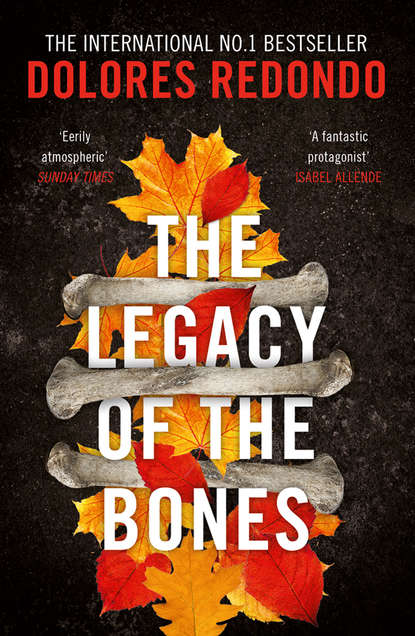По всем вопросам обращайтесь на: info@litportal.ru
(©) 2003-2024.
✖
The Legacy of the Bones
Автор
Год написания книги
2019
Настройки чтения
Размер шрифта
Высота строк
Поля
She was giggling uncontrollably and couldn’t stop.
‘I’m … I’m imagining your mother’s face when she finds out she has to take everything back.’
2 (#u68b5cde6-8bc1-5c6c-b39f-c381c5222a9f)
Three months later
Amaia thought she recognised the song that reached her, scarcely a whisper, from the living room. She had just finished clearing away the lunch things, and, drying her hands on a kitchen towel, she walked over to the door, the better to hear the lullaby her aunt was singing to Ibai in a soft, soothing voice. Yes, it was the same one. Although she hadn’t heard it for years, she recognised the song her Amatxi Juanita used to sing to her when she was little. The memory brought back her adored and much-lamented Juanita, wrapped in her widow’s weeds, hair swept up in a bun, fastened with silver combs that could barely contain her unruly white curls; her grandmother, the only woman who had cradled her as an infant:
Txitxo politori
zu nere laztana,
katiatu ninduzun,
libria nintzana.
Libriak libre dira,
zu ta ni katig,
librerik oba dana,
biok dakigu.
Sitting in the armchair near the blazing fire, Engrasi held the tiny Ibai in her arms, eyes fixed on his little face as she recited the old verses of that mournful lullaby. She was smiling, although Amaia distinctly remembered her grandmother weeping as she sang it to her. She wondered why, reflecting that perhaps Juanita already understood the suffering in her granddaughter’s soul, and shared her fears.
Nire laztana laztango
Kalian negarrez dago,
Aren negarra gozoago da
Askoren barrea baiño.
When the song finished, Juanita would dry her tears with the spotless handkerchief embroidered with her initials and those of her husband, the grandfather Amaia had never known, gazing down at her from the faded portrait that presided over the dining room.
‘Why are you crying, Amatxi? Does the song make you sad?’
‘Take no notice, my love, your amatxi is a silly old woman.’
And yet she sighed, clasping the girl still more tightly in her arms, holding her a little longer, although Amaia was happy to stay.
She stood listening to the end of the lullaby, relishing the pleasure of recalling the words just before her aunt sang them. In the air lingered an aroma of stew, burning logs and the wax on Engrasi’s furniture. James had fallen asleep on the sofa, and although the room wasn’t cold, Amaia went over, covering him as best she could with a small, red rug. He opened his eyes for an instant, blew her a kiss and carried on dozing. Amaia pulled up a chair next to her aunt and sat contemplating her: the old lady had stopped singing, yet she continued to gaze in awe at the face of the sleeping child. Engrasi looked at her niece, smiling as she held the child out for her to take. Amaia kissed him gently on the head before putting him in his cot.
‘Is James asleep?’ Engrasi asked.
‘Yes, we hardly slept a wink. Ibai sometimes has cholic after a feed, especially at night, so James was up in the small hours, pacing round the house with him.’
Engrasi turned to look at James. ‘He’s a good father,’ she said.
‘The best.’
‘What about you, aren’t you tired?’
‘No, you know me. I’m fine with a few hours’ sleep.’
Engrasi seemed to reflect, her face clouding for an instant, but then she smiled once more and gestured towards the cot.
‘He’s beautiful, Amaia, the most beautiful baby I’ve ever seen, and I’m not just saying that because he’s ours; there’s something special about Ibai.’
‘You can say that again!’ declared Amaia. ‘The baby boy who was supposed to be a girl but changed his mind at the last minute.’
Engrasi pulled a serious face. ‘That’s exactly what I think happened.’
Amaia looked puzzled.
‘I did a reading when you first became pregnant – just to make sure everything was all right – and it was obvious then that the baby was a girl. Over the following months, I consulted the cards several times, but never looked into the question of the baby’s sex again because it was something I already knew. Towards the end, when you were acting strangely, saying you felt unable to choose a name for the baby or to buy her clothes, I came up with a plausible psychological explanation,’ she said with a smile, ‘but I also consulted the cards. I must confess that, for a while, I feared the worst; that this uncertainty you felt, this paralysis, was a sign that your child would never be born. Mothers sometimes have premonitions like that, and they always reflect something real. But on that occasion, no matter how many times I consulted the cards about the baby’s sex, they wouldn’t tell me – and you know what I always say about the things the cards won’t tell us: if the cards won’t tell, then we’re not meant to know. Some things will never be revealed to us, because their nature is to remain mysterious; other things will be revealed when the time is right. When James called me early that morning, the cards couldn’t have been clearer. A boy.’
‘Are you saying you think I was going to have a girl but in the last month she turned into a boy? That’s physically impossible.’
‘Yes, I think you were going to have a daughter, I think you probably will have her one day, but I also believe this wasn’t the right time for her, that someone left the decision until the last moment and then decided you’d have Ibai.’
‘And who do you think took that decision?’
‘Perhaps the same one who gave him to you.’
Amaia stood up, exasperated.
‘I’m going to make some coffee. Do you want a cup?’
Aunt Engrasi ignored the question. ‘You’re wrong to deny it was a miracle.’
‘I’m not denying it, Auntie,’ she protested, ‘it’s just that …’
‘Don’t believe in them, don’t deny their existence,’ said Engrasi, invoking the old incantation against witches that had been popular as recently as a century earlier.
‘Least of all me,’ whispered Amaia, recalling those amber eyes, the fleeting, high-pitched whistle that had guided her through the forest in the middle of the night as she struggled with the feeling of being in a dream while at the same time experiencing something real.
She remained silent until her aunt spoke again.
‘When are you going back to work?’
‘Next Monday.’
‘How do you feel about it?’
‘Well, Auntie, you know I like my job, but I have to admit that going back has never felt this hard, not after the holidays, or after our honeymoon. Everything’s different now, now there’s Ibai,’ she said, glancing at his cot. ‘It feels too soon to be leaving him.’











